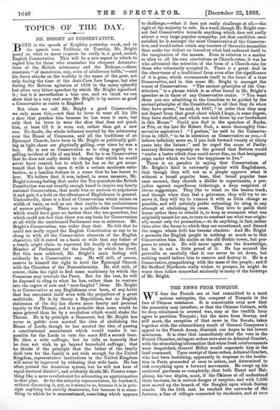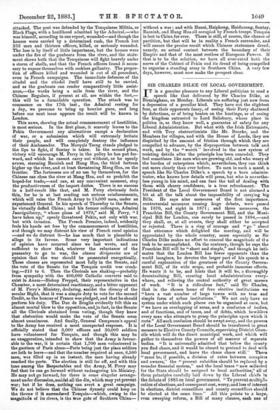THE NEWS FROM TONQUIN.
WE fear the French are at last committed to a most serious enterprise, the conquest of Tonquin in the face of Chinese resistance. It is conceivable even now that the peasantry may interfere, or that the Chinese Cabinet, with its deep reluctance to avowed war, may at the twelfth hour agree to partition Tonquin ; but the news from Sontay, and still more, the reception of that news in the Senate, taken together with the extraordinary result of General Campenon's appeal to the French Army, diminish our hopes to the lowest minimum. It is clear that immediately after the vote in the French Chamber, stringent orders were sent to Admiral Courbet, with the stimulating information that when fresh reinforcements were despatched, General Minot would supersede him in the land command. Upon receipt of these orders, Admiral Courbet, who had been hesitating, apparently in response to the hesita- tion in Paris, proceeded at once to action, and determined to risk everything upon a forward movement. He swept up his scattered garrisons so completely, that both Hanoi and Hai- phona, his two dep6ts, must, if the Chinese at all understand their business, be in serious danger of surprise, and with 7,040 men moved up the branch of the Songkoi upon whioh Sontay stands. On the 15th inst. he reached the outworks of the fortress, a line of villages connected by stockades, and at once
attacked. The post was defended by the Tonquinese Militia, or Black Flags, with a hardihood admitted by the Admiral,—who was himself, according to one report, wounded—and though the houses were carried by a determined rush, the French lost 233 men and thirteen officers, killed, or seriously wounded. The loss is by itself of little importance, but the houses were under the fire of the gunboats from the river, and the state- ment shows both that the Tonquinese will fight bravely under a storm of shells, and that the French officers found it neces- sary to expose themselves with reckless gallantry. The propor- tion of officers killed and wounded is out of all precedent, even in French campaigns. The immediate defences of the citadel and the citadel itself have still to be carried, and as the gunboats can render comparatively little assist- ance,—the works being a mile from the river, and the Chinese Regulars, if present at all, are within the fort,— this will be a formidable operation. The attack was to commence on the 17th just, the Admiral resting for a day, we presume to bring up heavier guns, and long before our next issue appears the result will be known in London.
This news, showing the actual commencement of hostilities, is most serious. In the first place, it scarcely leaves to the Pekin Government any alternatives except a declaration of war, or a submission which will extremely irritate their people, and will completely destroy the influence of their Ambassador. The Marquis Tseng stands pledged to the lips to fight, if Sontay is taken. In the second place, victory will encourage M. Ferry in the policy he has put for- ward, and which he cannot carry out without, as he openly avows, storming Baoninh and Hung Hoa, the third fortress higher up the river, and at least threatening Mang Hoa, on the frontier. The fortresses are of no use by themselves, for the Chinese can close the river at Mang Hoa, and so prohibit the hoped-for trade,—and can, at any convenient moment, stop the productiveness of the import duties. There is no success in a half-result like that, and M. Ferry obviously feels this, for he is at last sending out serious reinforcements, which will raise the French Army to 15,000 men, under an experienced General. In his speech of Thursday to the Senate, he virtually defied China ; and his former colleague, Admiral Jaureguiberry, "whose plans of 1879," said M. Ferry, "I have taken up," openly threatened Pekin, not only with war, but with invasion. The French Premier, indeed, evidently feels his hands set free by the commencement of hostilities, and though we may distrust his view of French rural opinion —and we do distrust it—he has much that is plausible to allege in its favour. Some very important indications of opinion have occurred since we last wrote, and are sufficient to show that, whatever the reluctance of the peasantry to go to war, the classes dirigeantes are of opinion that the war should be prosecuted energetically. Those classes are represented most fully in the Senate, and the vote of the Senate for the Tonquin credit was crush- ing,-215 to 6. Then the Clericals are shaking—probably from sympathy with the 400,000 Catholic converts said to exist in Anam—Bishop Freppel, their representative in the Chamber, a most determined reactionary, and a bitter opponent of M. Ferry's Ministry, declaring, amidst the dismay of the secular Right, that it was a simple duty to vote for the second Credit, as the honour of France was pledged, and that he should perform his duty. The Duo de Broglie evidently felt this an almost mortal blow to the opposition, and.in fact, in the Senate all the Clericals abstained from voting, though they knew that abstention would make the vote of the Senate seem almost unanimous. And finally, General Campenon's appeal to the Army has received a most unexpected response. It is officially stated that 3,000 officers and 30,000 soldiers have volunteered for Tonquin, and though this may be an exaggeration, intended to show that the Army is favour- able to the war, it is certain that 1,700 men volunteered in the garrison of Paris alone—Paris being just the place soldiers are loth to leave—and that the number required at once, 6,500 men, was filled up in an instant, the men having already reached the ports. The election is still far off, and with this tone among the Respectables and the Army, M. Ferry may feel that he can go forward without endangering his Ministry. He may not go forward, for there is some singular arrange-
ment under discussion, amidst all the din, which may yet prevent
war; but if he does, nothing can avert a great campaign. We do not believe that the Chinese dynasty could keep on
the throne if it surrendered Tonquin—which, owing to the magnitude of its rivers, is the true gate of Southern China—
without a war ; and with Hanoi, Haiphong, Haidzuong, Sontay, Bacninh, and Hung Hoa all occupied by French troops, Tonquin is lost to China for ever. There is still, of course, the chance of partition, but that will be in reality a French surrender, and will ensure the precise result which Chinese statesmen dread, namely, an actual contact between the boundary of their Empire and that of the most restless of European Powers. If that is to be the solution, we have all over-rated both the nerve of the Cabinet of Pekin and its dread of being compelled to organise a standing army in Southern China. A very few days, however, must now make the prospect clear.







































 Previous page
Previous page